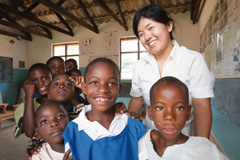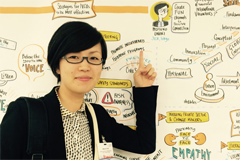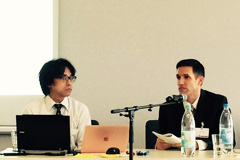Research Results on JOCV Presented at IVCO by Research Fellow Mayuko Onuki and Visiting Fellow Yasunobu Okabe
2016.12.28
The International Volunteering Conference (IVCO) was held in Bonn, Germany, October 9–12, 2016, with the theme of “Increasing Resilience of Communities through Volunteering.” JICA-RI Research Fellow Mayuko Onuki and JICA-RI Visiting Fellow Yasunobu Okabe (professor at Tohoku University) made their presentation on JICA-RI research project: "An Interdisciplinary Study of Japan Overseas Cooperation Volunteers.” Over 150 people participated in the discussion, representing 58 different organizations and over 30 countries.
In a presentation entitled “Key Competencies of Japan Overseas Cooperation Volunteers (JOCVs) and Their Roles in Successful Volunteer Outcomes,” Onuki shared the following three main findings based on her study through a survey conducted among Japan Overseas Cooperation Volunteers (JOCVs), before, during, and after their assignments:

JOCVs live and work together with the communities to which they were sent (Photo: JICA/Kenshiro Imamura)
During the Q&A session, questions were raised on the floor as to if there was a correlation between the level of specialization of the volunteers and their contribution, and as to why it appeared that there was little impact on development.
Okabe gave his presentation entitled "Social Capital Formation and the Role of Japan Overseas Cooperation Volunteers (JOCVs)” in the final day’s session called “Theory models: Volunteering for Development; the Environment of Volunteering.” He discussed what kind of on-the-ground changes volunteers can bring about for development cooperation, pointing out three essential functions of volunteers:

JICA-RI Research Fellow Mayuko Onuki
Okabe stated that these functions indicate the importance of networking and trust-building in local communities, namely social capital formation. By means of descriptive statistics using survey data, he measured their level of networking with local people and the level of trust at their workplace and in the community. As part of the Network index, number of newly developed close friends and number of times of participation in familial ceremonies were counted. According to the Trust Index, the degree of trust on people living in the neighborhood and that on colleagues at their workplace was investigated. As a result, both network and trust indices were rated high, and it indicated that international volunteering could contribute to social capital formation through networking and trust-building.
To complement quantitative analysis on, Okabe implemented a qualitative case study to verify the above three functions. The case was on a JOCV dispatched for food processing. She engaged herself on market research and wholesale, which were not her specializations, for the benefit of soybean farmers. Despite facing several failures, she continued to engage herself in tofu processing and marketing (volunteer functions 1 and 2 stated above). As a result, local people became sympathetic and cooperative with her and, finally, a hybrid product combining tofu and local bread was invented, which became popular among consumers (volunteer functions 1 and 3 stated above).
Kessy Reyes, senior program officer in charge of volunteer operations in the JICA Philippines Office, joined a discussion called “What Needs to be Done to Create Lasting Impact?” as a panelist and briefed on the disaster prevention projects with which he was involved.
Onuki, Okabe, and Eriko Sakamaki, who is a JICA-RI staff member as well as a former volunteer, agreed that JICA-RI’s research policy on international volunteers is in line with the international trend, although quantitative impact analysis is difficult and a limited number of rigorous empirical studies are available on the developmental impact of volunteers. They also agreed that more knowledge on Japanese volunteering should be disseminated internationally as JICA has been involved in most of the topics discussed at the IVCO.

JICA-RI Visiting Fellow Yasunobu Okabe (left)

事業事前評価表(地球規模課題対応国際科学技術協力(SATREPS)).国際協力機構 地球環境部 . 防災第一チーム. 1.案件名.国 名: フィリピン共和国.

事業事前評価表(地球規模課題対応国際科学技術協力(SATREPS)).国際協力機構 地球環境部 . 防災第一チーム. 1.案件名.国 名: フィリピン共和国.

事業事前評価表(地球規模課題対応国際科学技術協力(SATREPS)).国際協力機構 地球環境部 . 防災第一チーム. 1.案件名.国 名: フィリピン共和国.

事業事前評価表(地球規模課題対応国際科学技術協力(SATREPS)).国際協力機構 地球環境部 . 防災第一チーム. 1.案件名.国 名: フィリピン共和国.

事業事前評価表(地球規模課題対応国際科学技術協力(SATREPS)).国際協力機構 地球環境部 . 防災第一チーム. 1.案件名.国 名: フィリピン共和国.
scroll